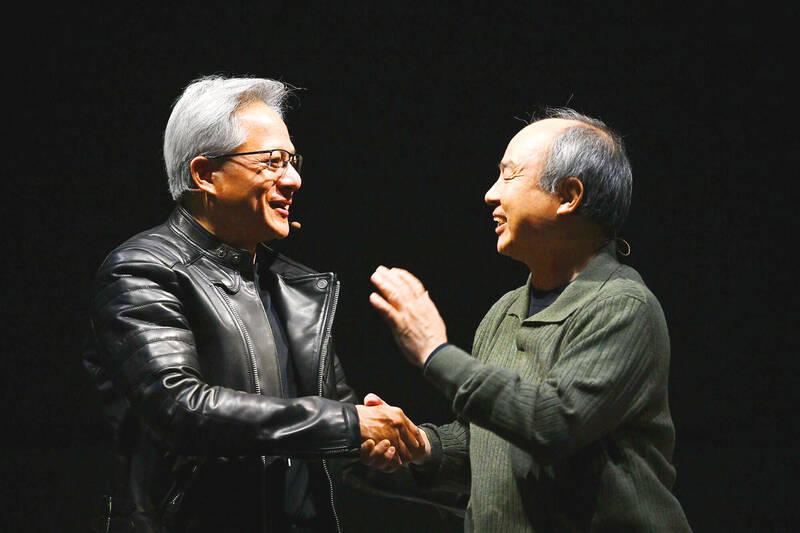Softbank Group Corp would be the first to build a supercomputer with chips using Nvidia Corp’s new Blackwell design, a demonstration of the Japanese company’s ambitions to catch up on artificial intelligence (AI).
The group’s telecom unit, Softbank Corp, plans to build Japan’s most powerful AI supercomputer to support local services, it said.
That computer would be based on Nvidia’s DGX B200 product, which combines computer processors with so-called AI accelerator chips.

Photo: Bloomberg
A follow-up effort will feature Grace Blackwell, a more advanced version, the company said.
The announcement indicates that Softbank Group, which until early 2019 owned 4.9 percent of Nvidia, has secured a favorable spot in line for the AI chips.
Softbank Group founder Masayoshi Son has said he is preparing to “swing for the fences” in AI bets.
The company on Tuesday reported a return to profitability on rising tech valuations.
Son joined Nvidia chief executive officer Jensen Huang (黃仁勳) on stage in Tokyo during Nvidia’s AI Summit yesterday.
When reminded of Softbank Group’s prior Nvidia stake — which would be worth about US$178 billion today — Son cringed and laughed, then wrapped Huang in a bear hug.
Nvidia has been crisscrossing the globe to host such events, promoting what it calls the new industrial revolution. Events in India and now Japan are aimed at broadening the deployment of AI systems to nation-based efforts and lessening Nvidia’s reliance on a few large US customers.
In addition to the new computer and the plan for a second, Softbank Group’s telecom unit would also use Nvidia gear to provide AI services over cellular networks. Traditional hardware, based on custom chips that are designed to maximize mobile data traffic, is not optimal for new AI services.
“What will result is an AI grid that runs across Japan,” Huang said, adding that this would change the communications network into an AI network.
New AI radio access networks, would be better-suited to remote robotics, autonomous vehicle support and powering other services, Huang said.
They would also require less electricity, he added.
The telecom unit would begin testing the network with partners Fujitsu Ltd and International Business Machines Corp’s Red Hat Inc.
“We are going to buy a lot of your chip,” Son told Huang.
Japan is on the cusp of change, said Son, who has often criticized both the country’s government and companies for their slowness in adopting new technologies.
This time, the Japanese government is not getting in the way of a buildout in AI and robotics, he said.
The Japanese government has allocated ¥4 trillion (US$26 billion) to bolster its domestic chip production capacity. That includes a moonshot project behind Rapidus Corp to build a state-of-the-art foundry from scratch to challenge Taiwan Semiconductor Manufacturing Co (台積電), which manufactures Nvidia chips. Japanese Prime Minister Shigeru Ishiba has also pledged more than US$65 billion of fresh support for the nation’s semiconductor and AI sectors.
“But they should encourage more,” Son told Huang. “As you say, this is the reset, this is the catch-up moment for this revolution. We can’t miss this time.”

The US dollar was trading at NT$29.7 at 10am today on the Taipei Foreign Exchange, as the New Taiwan dollar gained NT$1.364 from the previous close last week. The NT dollar continued to rise today, after surging 3.07 percent on Friday. After opening at NT$30.91, the NT dollar gained more than NT$1 in just 15 minutes, briefly passing the NT$30 mark. Before the US Department of the Treasury's semi-annual currency report came out, expectations that the NT dollar would keep rising were already building. The NT dollar on Friday closed at NT$31.064, up by NT$0.953 — a 3.07 percent single-day gain. Today,

‘SHORT TERM’: The local currency would likely remain strong in the near term, driven by anticipated US trade pressure, capital inflows and expectations of a US Fed rate cut The US dollar is expected to fall below NT$30 in the near term, as traders anticipate increased pressure from Washington for Taiwan to allow the New Taiwan dollar to appreciate, Cathay United Bank (國泰世華銀行) chief economist Lin Chi-chao (林啟超) said. Following a sharp drop in the greenback against the NT dollar on Friday, Lin told the Central News Agency that the local currency is likely to remain strong in the short term, driven in part by market psychology surrounding anticipated US policy pressure. On Friday, the US dollar fell NT$0.953, or 3.07 percent, closing at NT$31.064 — its lowest level since Jan.

The New Taiwan dollar and Taiwanese stocks surged on signs that trade tensions between the world’s top two economies might start easing and as US tech earnings boosted the outlook of the nation’s semiconductor exports. The NT dollar strengthened as much as 3.8 percent versus the US dollar to 30.815, the biggest intraday gain since January 2011, closing at NT$31.064. The benchmark TAIEX jumped 2.73 percent to outperform the region’s equity gauges. Outlook for global trade improved after China said it is assessing possible trade talks with the US, providing a boost for the nation’s currency and shares. As the NT dollar

The Financial Supervisory Commission (FSC) yesterday met with some of the nation’s largest insurance companies as a skyrocketing New Taiwan dollar piles pressure on their hundreds of billions of dollars in US bond investments. The commission has asked some life insurance firms, among the biggest Asian holders of US debt, to discuss how the rapidly strengthening NT dollar has impacted their operations, people familiar with the matter said. The meeting took place as the NT dollar jumped as much as 5 percent yesterday, its biggest intraday gain in more than three decades. The local currency surged as exporters rushed to